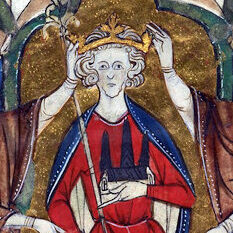1264

As usual, the initial fighting broke out in the west. Henry de Montfort scored an early triumph by bottling up Edward in Gloucester, but then unwisely accepted his cousin’s call for a truce. He had no sooner withdrawn his forces when Edward sacked the town and slipped away, causing Simon to bitterly reproach his son. The king meanwhile began gathering a large army at Oxford, where one of his first acts was to expel the student population. His intention, he explained, was to protect them from the savagery of his Scottish allies, but in fact he was clearly miffed by their true sympathies. Henry’s growing strength allowed him to brush aside a last-ditch offer by his opponents to respect Louis’ ruling on every point except the alien officials. The advantage was all his after he seized the Montfortian stronghold of Northampton, which was betrayed by local clergymen. The loss was devastating. Among the eighty barons and knights made prisoner were the younger Simon and many leading members of the movement. Montfort refused to despair. “War is such that the advantage first goes to these, then to those,” he declared and followed up by predicting that the enemy would be consumed by fear and confusion before May was out. London, however, was gripped by panic as word spread it was about to be betrayed like Northampton, resulting in the plunder and massacre of the Jews. As royalist forces burned and butchered their way through local hamlets, Simon attempted to draw them south by laying siege to their garrison in Rochester, whose inhabitants were subjected to a similar bloodletting. With barely London left to the reformist party, Simon gambled everything on seeking out and giving battle to the king. The two sides squared off in Sussex, with the royalists encamped in and around the village of Lewes and the Montfortians eight miles away in Fletching. Simon sent his bishop friends to Henry to reiterate his offer of peace if the king would observe only the provision prohibiting alien officials, sweetening it now to include 30,000 marks in compensation. Henry was inclined to accept, but Richard, aggrieved that his property had been ransacked, was against it, as was Edward. The one-time idealist and reformer declared that peace was only possible if his uncle and the others came to them with halters around their necks.

The massacre of the Jews was given special notice by chronicler Thomas of Wykes, who named John fitz John, the son of confederate John fitz Geoffrey, as the thug who slew the richest Jew in the city, Kokben Abraham. Montfort, who Wykes disparages throughout his chronicle, is condemned for demanding a share of the ill-gotten gains for his cause. Wykes goes on to lament the loss of this money to the king’s exchequer.
Henry’s increasingly hardened attitude led him to demand the execution of those students from Oxford found among the prisoners in Northampton. He relented only after being reminded that such an atrocity would alienate some of the most powerful families in the kingdom. But his patience snapped after his cook was killed by a bowman lurking in the woods. The king ordered 315 captured archers to appear before him in a place called Flimwell and, acting on Richard’s counsel, had them all beheaded in retaliation.